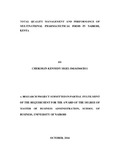| dc.description.abstract | The globalization trend is influencing how organizations set plans and operate to achieve their objectives and one way of realizing these objectives is incorporating TQM programs into the strategy choice process in order to continuously improve operations, customer relations, and overall organizational performance. The aim of this research was to establish the relationship between Total Quality Management practices and performance of Multinational Pharmaceutical Firms in Nairobi, Kenya. The objectives were; to establish TQM practices used; to establish the performance measures applied and to determine the relationship between TQM and performance of the multinational pharmaceutical firms in Nairobi, Kenya. The research adopted a descriptive research design. Data was collected using a self-administered questionnaire that was distributed to 25 operations/quality managers of the sampled multinational pharmaceutical firms of which 21 respondents returned dully filled questionnaires. The data was then presented in form of tables, pie charts and analysed
using mean and standard deviation and a regression equation was formulated to show the relationship. The finding gave a positive relationship between TQM and organizational performance.
It was found that if TQM is implemented properly, it produces a variety of benefits such
as meeting the customers’ needs, improved internal communication and better problem
solving capacity of the firm. This research recommends that in order to get the full potential of TQM it is necessary to train all people at all levels in order to create TQM awareness, interest, desire and action. Thus, top management attention might be fruitfully focused on the development of appropriate training programs on TQM adoption and implementation. Similarly, managers should consider suppliers as business partners and for successful realization of TQM benefits; they need to be brought on board. One limitation of this study is that it used perceptual data provided by operations managers/quality managers which may not provide clear measures of performance | en_US |

